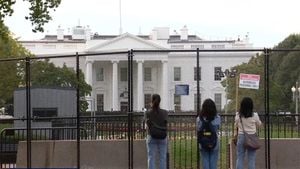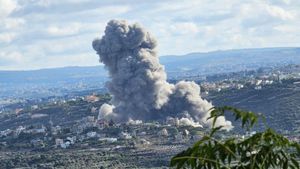The United States has ramped up its military presence in the Middle East as tensions between Iran and Israel reach new heights. With the Pentagon announcing the deployment of F-15 Strike Eagles and the sophisticated Terminal High Altitude Area Defense (THAAD) system, this latest move signals America’s commitment to supporting Israel amid threats from Tehran.
Recent developments have escalated following Iran's missile barrage aimed at Israel. On October 1, almost 200 ballistic missiles were launched by Iranian forces, marking one of the most significant escalations of hostilities between the two nations. Not long after, Israel retaliated with targeted airstrikes on Iranian military sites on October 26, prompting dire warnings from Iranian leaders. Ayatollah Ali Khamenei, Iran's supreme leader, has publicly declared intentions for "a crushing response" against both Israel and the United States for their military actions.
The diplomatic dialogue has also shifted, with the U.S. accused of encouraging Israel to respond to Iranian provocations. President Biden's administration has been clear about its stance, emphasizing the need for Israel's responses to be targeted and proportional to minimize civilian harm. Nonetheless, the U.S. continues to bolster its military partnerships and assets in the region, which includes sending several B-52 bombers, destroyers, and fighter jets to support stability.
Pentagon spokesperson Maj. Gen. Pat Ryder confirmed the deployment of B-52s tasked with delivering substantial firepower and reinforcing deterrence policies. The aim is to safeguard U.S. interests and protect American forces stationed throughout the region. This strategy is part of wider efforts to discourage any full-scale military confrontation by Iran and serve as protection against potential airstrikes or missile launches.
Meanwhile, Iran has issued sharp rhetoric, with officials warning against U.S. forces operating within Israel. This has led to heightened fears of military conflict spilling over beyond conventional warfare and entering realms of responsibility for both nations. Iranian Foreign Minister Abbas Araghchi has publicly stated the deployment of U.S. troops would place their lives at unnecessary risk.
This military buildup also correlates with regional defense needs as Israel pursues its own acquisition of fighter jets to modernize its aviation capabilities. After Israel's Defense Ministry signed off on purchasing 25 F-15 jets from the U.S. worth $5.2 billion, procurement of enhanced military technology shows Israel’s determination to maintain its edge over adversaries like Iran.
The THAAD battery sent to Israel, approved by Defense Secretary Lloyd Austin, aims to intercept incoming missiles, particularly those launched by Iranian forces. The THAAD system is equipped to demolish ballistic missiles during their terminal phase, effectively acting as a protective shield for Israeli cities and military installations. It features truck-mounted launchers, multiple interceptors, and sophisticated radar systems. The deployment is expected to include around 95 personnel dedicated to operating the system.
Overall, the shifting balance of military might and regional security concerns suggests we may be on the verge of another significant chapter of conflict involving Iran, Israel, and by extension, the interests of the United States. With the added presence of American military assets, analysts speculate on potential strategies from Iran, which may include retaliation not only against Israel but against American forces positioned nearby.
Some experts believe Iran aims to navigate this conflict carefully, finding opportunities for face-saving measures to preserve its reputation without incurring costly military engagements. Others see the potential for indirect confrontations through proxies operating throughout the region. Meanwhile, the humanitarian situation continues to deteriorate, with citizens of both Israel and Iran left to grapple with the uncertainties posed by their governments’ military agendas.
The situation remains fluid, and the international community watches closely as the Pentagon’s actions reflect America's broader strategic interests and commitments following Israel's series of military engagements. The stakes are high, and continued provocations on either side could easily result in greater instability throughout the Middle East.
Maintaining dialogue alongside military preparedness is considered key to avoiding potential escalations. The U.S. administration remains firm on its ally’s side, ensuring resources and defense systems are readily available to protect Israel from Iranian threats, all the mientras fostering communication channels for diplomacy and de-escalation.



